How I Fixed My Sleep
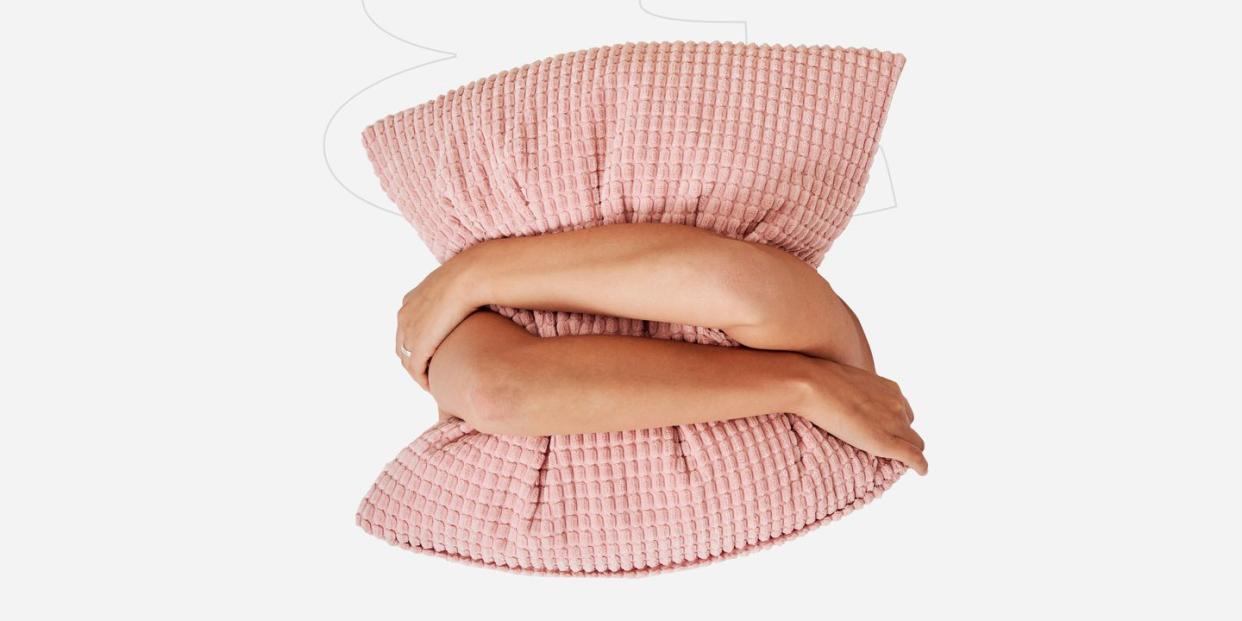
"Hearst Magazines and Yahoo may earn commission or revenue on some items through the links below."
For most of my adult life my sleep has been, scientifically speaking, completely fucked. I stayed up late and woke up early. I slammed caffeine in the afternoon and cocktails late into the evening. Fourth meals and midnight snacks were always on the menu. My preferred method of conking out: mindlessly scrolling through my phone until I couldn't any longer. After a bad night's rest, I’d promise myself I’d make it up tomorrow, or next weekend. Sometimes I'd be able to sleep in a little on Saturday or Sunday; sometimes I wouldn’t. Then, come Monday, I'd repeat the process. I was never sure how much sleep I was getting—or not getting—but I accepted that feeling groggy and run down all the time was a part of living.
Sound familiar?
Scant sleep is an epidemic in America. According to the CDC, 70 percent of adults don't catch enough Zzzzs at least one night each month, and a whopping 11 percent receive insufficient sleep every day. Researchers found that while it’s a problem that affects every socioeconomic class, minorities and the working class bear the brunt of it.
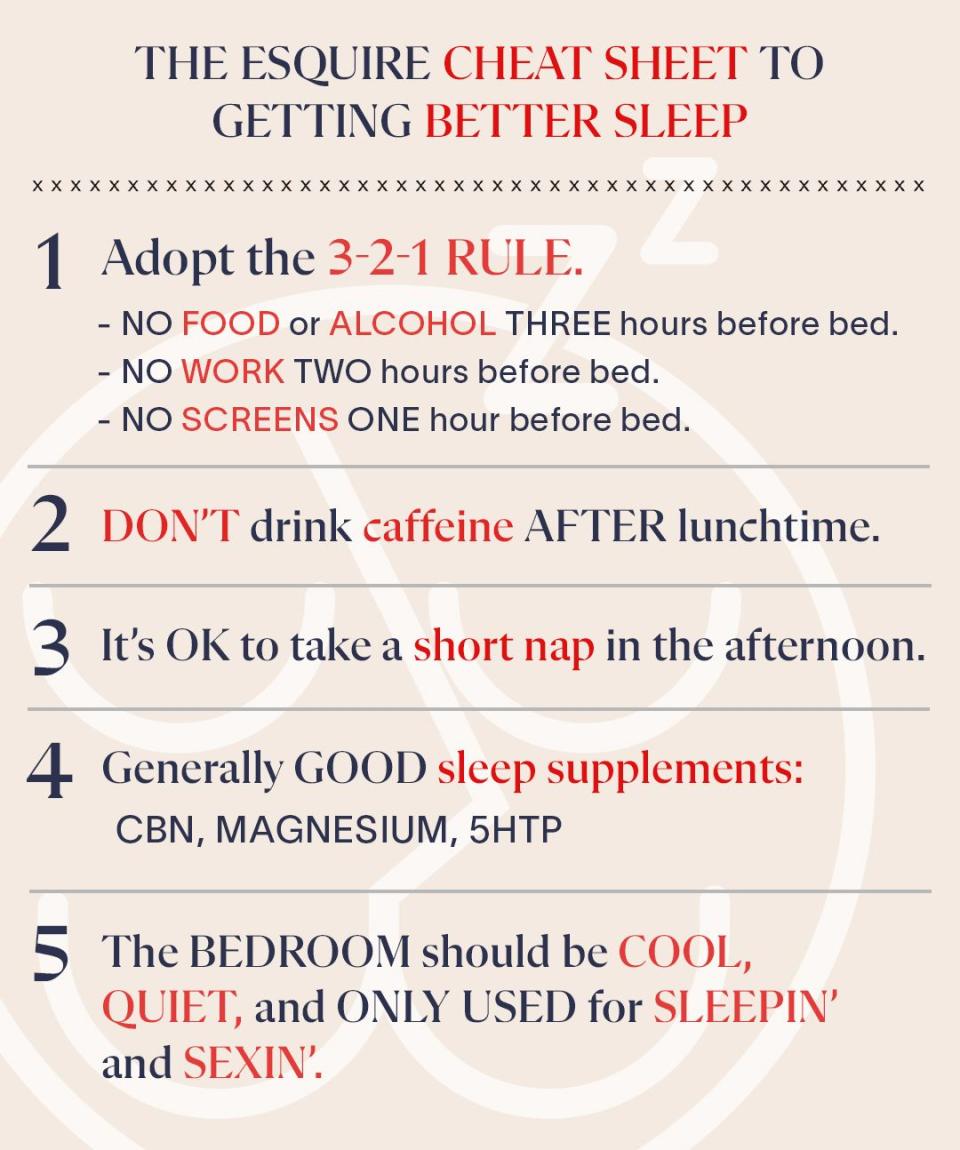
We all know how a bad night of sleep makes you feel. You’re irritable. You have a hard time focusing and remembering. You might snap at the simplest requests. In short, you are not yourself. Ask any new parent what weeks or even months of sleep deprivation does and they’ll report everything from anxiety to depression to getting sick all the time. Now there's a growing body of evidence that a lifetime of poor sleep can potentially lead to catastrophic health problems. According to a series of studies spearheaded by Harvard University, those include obesity, cardiovascular disease, diabetes, and dementia.
Scary, no? I’m 41 (Jesus Christ really?), and the idea that I might be increasing my odds of having a heart attack or losing my mind was sobering. But I wasn’t sure how to fix it. I know my own limitations—I wasn’t able to hit my fitness goals until I got a personal trainer—so I polled my friends, family, and colleagues…only to find that not a single one gets decent sleep.
So I turned to the option of last resort: I hired a sleep coach.
Or at least something like it. Justin Roethlingshoefer is the founder of Own It Coaching, a service that helps high-functioning people such as Fortune 500 CEOs, professional athletes, start-up founders be better at, well, life. His approach—holistic and data-driven— focuses on improving everything from nutrition to exercise to mindfulness to sleep. If your mind and body are balanced, espouses Roethlingshoefer, you can excel at anything.
I’m no CEO, but Roethlingshoefer agreed to take my case, crunch my data, and see where I could make improvements.
During our first Zoom meeting, Roethlingshoefer asked about my lifestyle. He has the intensity and focus of a pro athlete tempered by the patience and understanding of a good doctor. (Makes sense; he holds a masters in sport performance and human biology, and he's worked as a performance director for the NHL and the NCAA.) I went through my fitness routine—HIIT training once a week; cardio, weights, and yoga the rest of the time—and he nodded approvingly. We talked through my bedroom setup (cool, quiet, comfortable) and lighting (low, dimmable) which he said are also good.
Then he asked about my food and alcohol intake. Bad news! I usually eat dinner too late and drink too much booze. (I’m an Esquire editor, it’s part of the job.) Such consumption so close to bedtime, he explained, loads my body with a lot more digestive work. This disrupts sleep.
“When’s the latest you have caffeine during a typical day?” he asked. I told him about my daily four o'clock espresso—one of my favorite routines. He shook his head verydisapprovingly. “Caffeine has a half-life of five to seven hours," he said. "If you drink a cappuccino with 180 milligrams of caffeine at 4:00, there'd still be 90 milligrams in your system at 11pm.” We formulated a plan. I'd replace my beloved espresso with an afternoon decaf.
He also suggested a small tweak to my fitness routine: adding a set of sprints to my jogging. He told me to pick a bedtime and a wake-up time, and to stick to them. (I settled on, respectively, 11pm and 7am.) And, like practically everyone else on the planet, I’m on my smartphone way too much. Turns out the light from the screen tricks my brain into thinking it’s still daylight, which prevents my body from releasing the hormones that help me sleep.
I told Roethlingshoefer this was a lot to combat. Unfazed, he suggested I start by adhering to what he called the 3-2-1 rule.
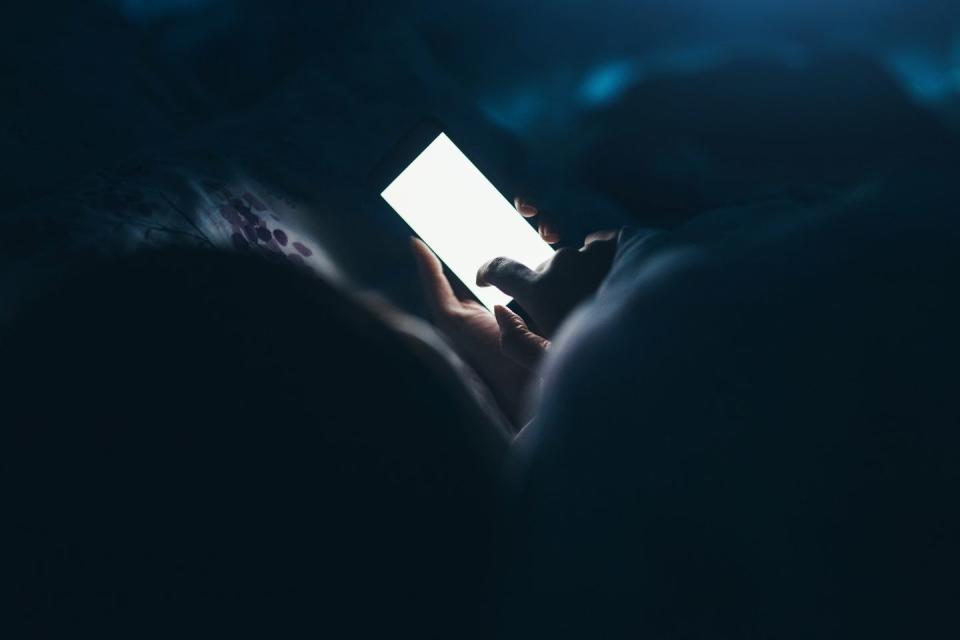
Follow the 3-2-1 Rule
Roethlingshoefer explained that optimal sleep is only achieved under optimal conditions. That meant no eating or drinking for three hours before bed. (Water is fine.) Stop working two hours before lying down—no last-minute emails, no paying overdue bills. One hour beforehand, turn off any and all screens—smartphones, tablets, and yes, television.
I mostly adhere to the 3 and the 2 of the 3-2-1 rule. But putting away my screens? That proves hard. The first week is agonizing. At first, I need to put my phone in another room to resist its siren call. I replace it with reading physical books, doing yoga, or listening to old Alan Watts lectures. The goal is to entice my algorithm-addled brain with something to look forward to other than doom-scrolling through TikTok or raging at some dumb tweet.
It gets easier. After a couple of weeks, I start actually looking forward to stashing my phone toward the end of the day. Shocking, I know.
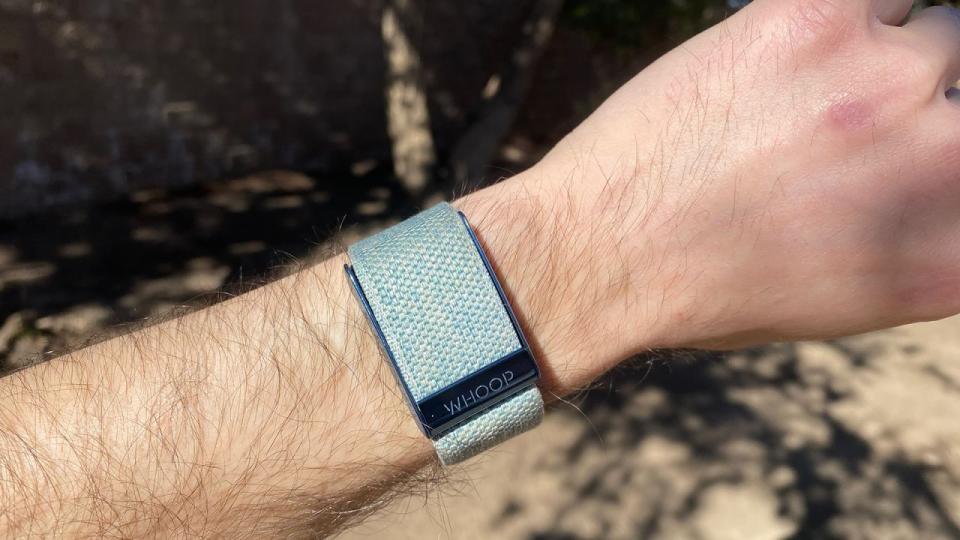
Use Gadgets to Track Your Sleep
Roethlingshoefer wanted to measure my heart rate variability, or HRV: the time, usually measured in milliseconds, between each heartbeat. He explained that, generally speaking, the higher your HRV, the better shape you’re in; an increase in HRV is a clear, if indirect, sign your sleep has improved. He suggested I get a sleep tracker. He likes the Whoop, a fitness gadget favored by pro athletes like Lebron James and Patrick Mahomes. It's a sleek black wristband fitted with a removable module that records a staggering amount of health data: blood oxygen levels, resting heart rate, skin temperature, and much more.
Right away, I love the comprehensive data the Whoop provides. The app is well designed and the UI is intuitive. I don’t love wearing a second gadget next to my Apple Watch, and whenever the Whoop’s band gets wet, it tends to stay wet. Nevertheless, I strap on the Whoop and deal with its slightly annoying presence—for journalism!
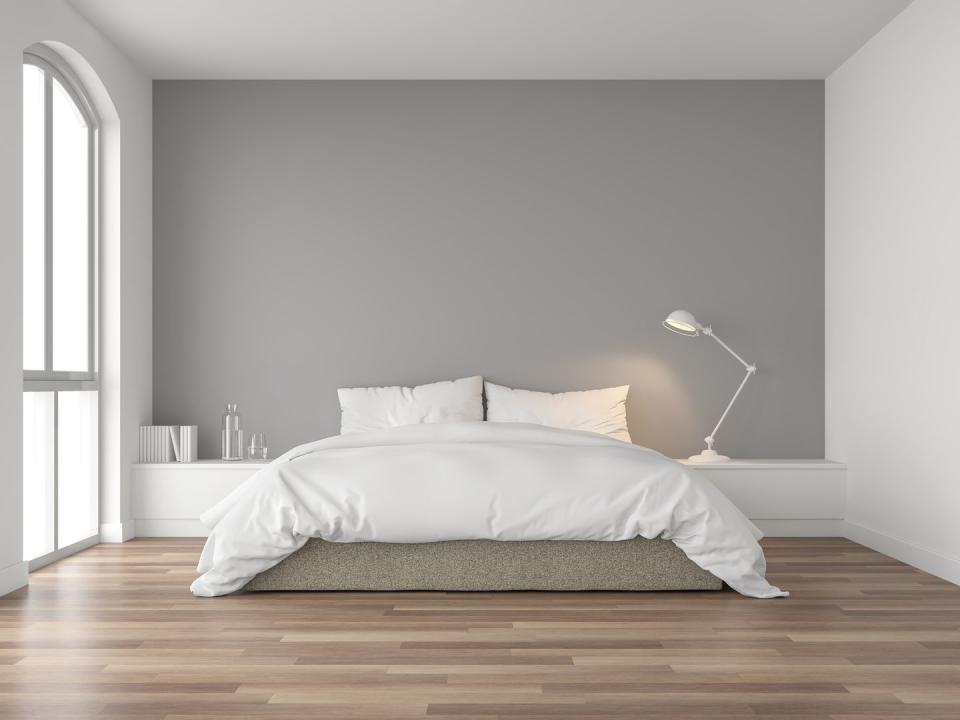
Optimize Your Bedroom
Roethlingshoefer told me the bedroom should be used for two things: sleeping and sex. It should be free of distractions—no screens, no eating or drinking, no work. The temperature should be set between 60 and 67° F.
Thankfully, I have this part locked in. I live in a small surf town on the California coast that's cool and quiet year-round. My bedroom is adorned with blackout shades and a Casper Nova Hybrid mattress that I adore. But Roethlingshoefer said to keep animals off the bed, an injustice my dog has not had to suffer. Now he does. Every night I put him in his (very plush and fancy) crate and bolt the door.
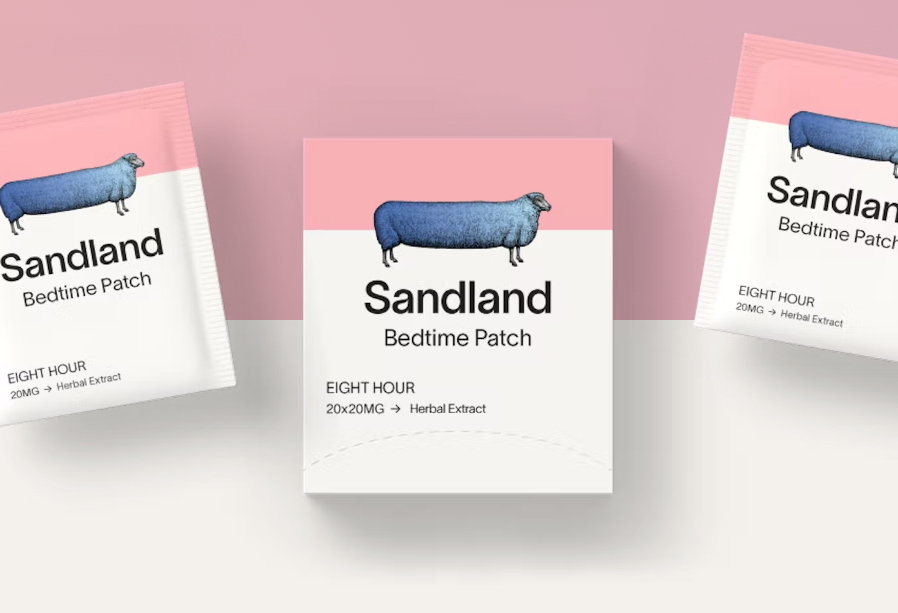
Consider Sleep Drugs
For decades, I relied on one of the deadliest drugs to fall asleep. And that drug is black tar heroin.
Kidding! It’s alcohol. Booze is by far one of the worst things you can consume before going to bed: It wreaks havoc on REM sleep, causes your central nervous system to wake you up repeatedly at night, and suppresses the production of the sleep hormone melatonin.
Speaking of which, I used to take melatonin supplements whenever I really needed to fall asleep, or when I was walloped by serious jet lag. No more. Roethlingshoefer said that since our bodies already make melatonin, adding more may help in the short term but be disruptive in the long-.
With alcohol and melatonin out, I look to an old friend called cannabis. Specifically a cannabinol extract called CBN. First discovered in the thirties and synthesized in the fourties, it is essentially a hemp derivative made from oxidized CBD. It doesn't contain THC, so I don’t get high. The effect is a pleasant drowsiness not unlike the exhaustion I feel after a very productive day.
Sandland makes a range of sublingual tablets containing varying CBN levels that you take an hour or so before going to bed. The company recommends taking one to two tablets, but I’ve found I’m down after taking just half a tab. I wake up in the morning without any of the grogginess I’ve experienced with melatonin, booze, or other forms of cannabis. The best part? It’s not addictive—at least as far as I can tell. The only issue is that, due to our nation’s archaic and idiotic drug laws, the legality of CBN remains something of a gray area. While it’s perfectly legal in many states, federal law dictates that products containing it and other cannabis extracts are illegal for medical use. My advice? Check your local laws and proceed with caution.
Ask Yourself: How Does It Feel?
After three weeks of my new routine—cutting caffeine in the afternoon, changing my exercise routine, drinking less booze, taking ten-minute afternoon naps, sticking to a consistent bedtime, adhering to the 3-2-1 rule—I begin to notice a change. It’s subtle at first, but I don’t feel run down during the day. Like, at all. I have energy; my brain seems to be firing on all cylinders; I’m less irritable. Workouts seem a little easier and recovery occurs faster. The fog of fatigue that enshrouded my brain for years has seemingly evaporated. I feel good, man.
The data from my Whoop backs this up. Over Zoom, Roethlingshoefer reports my overall HRV is higher, which suggests my body is getting better rest. I tell him I've notice one very weird thing: I used to be able to easily function on very little sleep. Three hours or less? No problem. Now, on the odd night I get anything less than six hours, I feel absolutely obliterated the next day, bordering on non-functional. What gives? “Your baseline is higher now,” he says. Because my body is getting used to the rest and recovery it needs, I feel the effects of insufficient sleep more acutely.
This is How You Hack Your Sleep
There are no shortcuts to getting a better night's sleep. You must make the necessary lifestyle shifts. That means turning in earlier, not drinking late at night, and—maybe most importantly for me—not looking at screens before hitting the sack. It doesn’t mean living like a Spartan who hates fun. There are nights where I still rage a little, like when I’m reporting for Esquire’s Best Bars in America or Best New Restaurants lists. Sure, I’m tender the next morning, but that’s a fair price to pay for feeling great overall.
These techniques do not make a one-size-heals-all solution. What works for me may not work for you. I'm still refining my own habits; I recently swapped my Whoop for the svelter Oura Ring. Just remember that getting great, restful sleep doesn’t have to be some far off dream.
You Might Also Like

